虚拟语气用法归纳与练习
【英语】虚拟语气-知识点归纳与练习经典
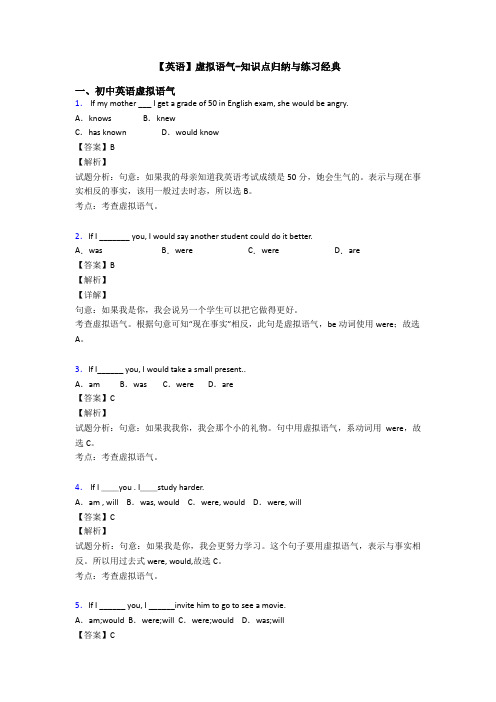
【英语】虚拟语气-知识点归纳与练习经典一、初中英语虚拟语气1. If my mother ___ I get a grade of 50 in English exam, she would be angry.A.knows B.knewC.has known D.would know【答案】B【解析】试题分析:句意:如果我的母亲知道我英语考试成绩是50分,她会生气的。
表示与现在事实相反的事实,该用一般过去时态,所以选B。
考点:考查虚拟语气。
2.If I _______ you, I would say another student could do it better.A.was B.were C.were D.are【答案】B【解析】【详解】句意:如果我是你,我会说另一个学生可以把它做得更好。
考查虚拟语气。
根据句意可知“现在事实”相反,此句是虚拟语气,be动词使用were;故选A。
3.If I______ you, I would take a small present..A.am B.was C.were D.are【答案】C【解析】试题分析:句意:如果我我你,我会那个小的礼物。
句中用虚拟语气,系动词用were,故选C。
考点:考查虚拟语气。
4. If I __you . I__study harder.A.am , will B.was, would C.were, would D.were, will【答案】C【解析】试题分析:句意:如果我是你,我会更努力学习。
这个句子要用虚拟语气,表示与事实相反。
所以用过去式were, would,故选C。
考点:考查虚拟语气。
5.If I ______ you, I ______invite him to go to see a movie.A.am;would B.were;will C.were;would D.was;will【答案】C【解析】试题分析:句意:如果我是你,我会邀请他去看电影。
(完整版)英语虚拟语气语法归纳总结
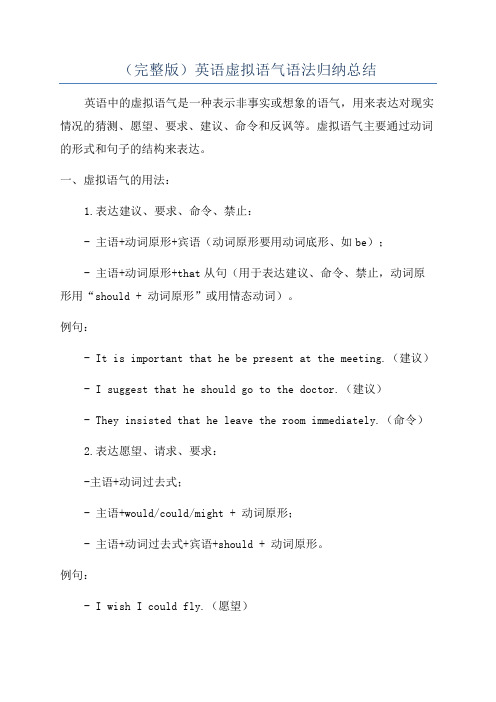
(完整版)英语虚拟语气语法归纳总结英语中的虚拟语气是一种表示非事实或想象的语气,用来表达对现实情况的猜测、愿望、要求、建议、命令和反讽等。
虚拟语气主要通过动词的形式和句子的结构来表达。
一、虚拟语气的用法:1.表达建议、要求、命令、禁止:- 主语+动词原形+宾语(动词原形要用动词底形、如be);- 主语+动词原形+that从句(用于表达建议、命令、禁止,动词原形用“should + 动词原形”或用情态动词)。
例句:- It is important that he be present at the meeting.(建议)- I suggest that he should go to the doctor.(建议)- They insisted that he leave the room immediately.(命令)2.表达愿望、请求、要求:-主语+动词过去式;- 主语+would/could/might + 动词原形;- 主语+动词过去式+宾语+should + 动词原形。
例句:- I wish I could fly.(愿望)- I would appreciate it if you could help me.(请求)3.表示虚拟条件:- If条件从句中的谓语动词用过去完成时,主句用would/should/might/could + have + 过去分词;- If条件从句中的谓语动词用过去时,主句用would/should/could + 动词原形。
例句:- If I had known his phone number, I would have called him.(虚拟条件)- If you had listened to me, we could have finished the project earlier.(虚拟条件)4.表达建议、要求、祝愿:- If only内部称述 + 主语 + 过去式。
虚拟语气用法小结及练习(附答案)
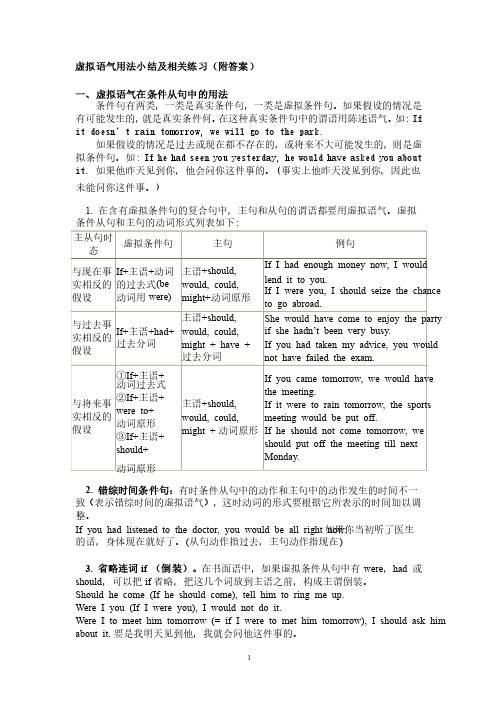
虚拟语气用法小结及相关练习(附答案)一、虚拟语气在条件从句中的用法 条件句有两类,条件句有两类,一类是真实条件句,一类是真实条件句,一类是真实条件句,一类是虚拟条件句。
一类是虚拟条件句。
一类是虚拟条件句。
如果假设的情况是如果假设的情况是有可能发生的,就是真实条件何。
在这种真实条件句中的谓语用陈述语气。
如: If it doesn’t rain tomorrow, we will go to the park.如果假设的情况是过去或现在都不存在的,如果假设的情况是过去或现在都不存在的,或将来不大可能发生的,或将来不大可能发生的,则是虚拟条件句。
如拟条件句。
如: : If he had seen you yesterday, yesterday, he he would have asked you about it. it. 如果他昨天见到你,他会问你这件事的。
如果他昨天见到你,他会问你这件事的。
(事实上他昨天没见到你,因此也未能问你这件事。
未能问你这件事。
) )1. 在含有虚拟条件句的复合句中,主句和从句的谓语都要用虚拟语气。
虚拟条件从句和主句的动词形式列表如下: 主从句时态虚拟条件句虚拟条件句 主句主句 例句例句 与现在事与现在事 实相反的实相反的 假设假设 If+主语+动词动词 的过去式(be 动词用were) 主语+should, would, could, might+动词原形动词原形 If I had enough money now, I would lend it to you. If I were you, I should seize the chance to go abroad. 与过去事与过去事 实相反的实相反的 假设假设 If+主语+had+ 过去分词过去分词 主语+should, would, could, might + have + 过去分词过去分词 She would have come to enjoy the party if she hadn’t been very busy. If you had taken my advice, you would not have failed the exam. 与将来事与将来事 实相反的实相反的 假设假设 ①If+主语+ 动词过去式动词过去式②If+主语+ were to+ 动词原形动词原形 ③If+主语+ should+ 动词原形动词原形 主语+should, would, could, might + 动词原形动词原形 If you came tomorrow, we would have the meeting. If it were to rain tomorrow, the sports meeting would be put off. If he should not come tomorrow, we should put off the meeting till next Monday. 2. 错综时间条件句:有时条件从句中的动作和主句中的动作发生的时间不一致(表示错综时间的虚拟语气)(表示错综时间的虚拟语气),,这时动词的形式要根据它所表示的时间加以调整。
虚拟语气的用法归纳

虚拟语气的用法归纳一、虚拟语气的概念和基本用法虚拟语气是一种表达说话者主观愿望,假定或假设情态的语气形式。
在英语中,虚拟语气使用多个动词形式来表示,如虚拟谓语动词(should/had/be)、过去时态(were/was)等。
1. 表示与现实相反的情况当我们想要表达与现实相反的情况时,可以使用虚拟语气。
例如:- If I were you, I would study harder.(如果我是你,我会更努力学习。
)2. 表示建议、要求或命令在某些情况下,我们使用虚拟语气来表示建议、要求或命令。
常用动词包括suggest(建议)、recommend(推荐)、request(请求)、demand(要求)等。
例如:- The teacher suggested that she attend the conference.(老师建议她参加会议。
)3. 表示对过去事件的假设当我们对过去事件进行假设时,可以使用虚拟语气的过去式形式来说明这种条件可能性很低或根本不可能发生。
例如:- If he had studied harder, he would have passed the exam.(如果他学得更努力,他就能通过考试了。
)二、常见的虚拟语气用法及例句1. 虚拟条件句虚拟条件句表示与现实相反的条件和可能性。
根据真实性、虚假性和时间性的不同,分为三种类型:- Type 1:表示可能发生的情况。
If + 主语 + 动词过去式,主语 + would/could/might + 动词原形。
例如:If it rains tomorrow, we will stay at home.(如果明天下雨,我们会待在家里。
)- Type 2:表示现在或将来不太可能发生的情况。
If + 主语 + 动词过去式,主语 + would/could/might + 动词原形。
例如:If I were rich, I would travel around the world.(如果我有钱,我会周游世界。
英语虚拟语气的基本用法归纳(优秀9篇)
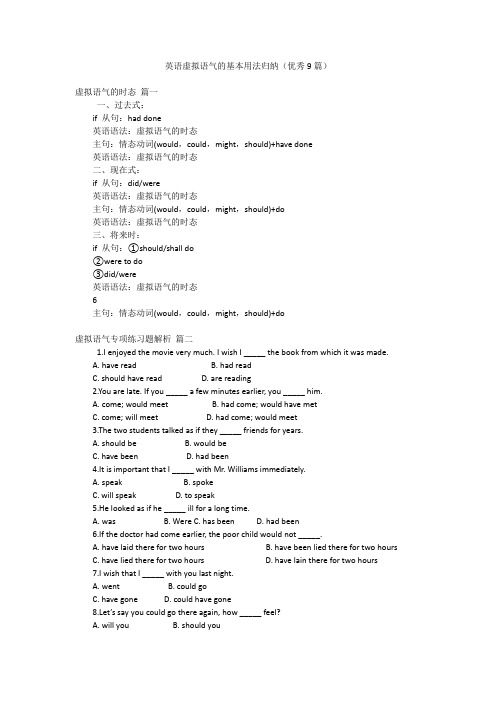
英语虚拟语气的基本用法归纳(优秀9篇)虚拟语气的时态篇一一、过去式:if 从句:had done英语语法:虚拟语气的时态主句:情态动词(would,could,might,should)+have done英语语法:虚拟语气的时态二、现在式:if 从句:did/were英语语法:虚拟语气的时态主句:情态动词(would,could,might,should)+do英语语法:虚拟语气的时态三、将来时:if 从句:①should/shall do②were to do③did/were英语语法:虚拟语气的时态6主句:情态动词(would,could,might,should)+do虚拟语气专项练习题解析篇二1.I enjoyed the movie very much. I wish I _____ the book from which it was made.A. have readB. had readC. should have readD. are reading2.You are late. If you _____ a few minutes earlier, you _____ him.A. come; would meetB. had come; would have metC. come; will meetD. had come; would meet3.The two students talked as if they _____ friends for years.A. should beB. would beC. have beenD. had been4.It is important that I _____ with Mr. Williams immediately.A. speakB. spokeC. will speakD. to speak5.He looked as if he _____ ill for a long time.A. wasB. WereC. has beenD. had been6.If the doctor had come earlier, the poor child would not _____.A. have laid there for two hoursB. have been lied there for two hoursC. have lied there for two hoursD. have lain there for two hours7.I wish that I _____ with you last night.A. wentB. could goC. have goneD. could have gone8.Let’s say you could go there again, how _____ feel?A. will youB. should youC. would youD. do you9.I can’t stand him. He always talks as though he _____ everything.A. knewB. knowsC. has knownD. had known10._____ the fog, we should have reached our school.A. Because ofB. In spite ofC. In case ofD. But for11.If you had told me in advance, I _____ him at the airport.A. would meetB. would had metC. would have metD. would have meet12.Mike can take his car apart and put it back together again. I certainly wish he_____ me how.A. teachesB. will teachC. has taughtD. would teach13.I would have told him the answer, had it been possible, but I _____ so busy then.A. had beenB. wereC. wasD. would be14.He’s working hard for fear that he _____.A. should fall behindB. fell behindC. may fall behindD. would fallen behind15.If it _____ another ten minutes, the game would have been called off.A. had rainedB. would have rainedC. have seenD. rained16.He suggested that they _____ use a trick instead of fighting.A. shouldB. wouldC. doD. had17.My father did not go to New York; the doctor suggested that he _____ there.A. not wentB. won’t goC. not goD. not to go18.I would have gone to the meeting if I _____ time.A. had hadB. have hadC. hadD. would have had19.Would you rather I _____ buying a new bike?A. decided againstB. will decide againstC. have decidedD. shall decide against20.You look so tired tonight. It is time you _____.A. go to sleepB. went to sleepC. go to bedD. went to bed21、—Why didn’t you buy a new car?—I would have bought one if I _____ enough money.A. hadB. have hadC. would haveD. had had22.If she could sew, _____.A. she make a dressB. she would have made a shirtC. she will make a shirtD. she would had made a coat23._____ today, he would get there by Friday.A. Would he leaveB. Was he leavingC. Were he to leaveD. If he leaves24.His doctor suggested that he _____ a short trip abroad.A. will takeB. would takeC. takeD. took25.The Bakers arrived last night. If they’d only let us know earlier,_____ at the station.A. we’d meet themB. we’ll meet themC. we’d have met themD. we’ve met them26.If I _____ you, I _____ more attention to English idioms and phrases.A. was; shall payB. am; will payC. would be; would payD. were; would pay27.We might have failed if you _____ us a helping hand.A. have not givenB. would not giveC. had not givenD. did not give28.The law requires that everyone _____ his car checked at least once a year.A. hasB. hadC. haveD. will have29.It is strange that he _____ so.A. would sayB. would speakC. should sayD. will speak30.Had I known her name, _____A. or does she know mine?B. and where does she live?C. she would be beautiful.D. I would have invited her to lunch.31.He has just arrived, but he talks as if he _____ all about that.A. knowB. knowsC. knownD. knew32.If I _____ the money, I would have bought a much bigger car.A. possessedB. ownedC. hadD. had had33.He was very busy yesterday; otherwise, he _____ to the meeting.A. would comeB. cameC. would have comeD. will come34.The librarian insists that John _____ no more books from the library before he returns all the books he has borrowed.A. will takeB. tookC. takeD. takes35.I left very early last night, but I wish I _____ so early.A. didn’t leaveB. hadn’t leftC. haven’t leftD. couldn’t leave36.I do not have a job. I would find one but I _____ no time.A. hadB. didn’t haveC. had hadD. have37.I wish that you _____ such a bad headache because I’m sure that you would have enjoyed the concert.A. hadn’tB. didn’t have hadC. hadn’t hadD. hadn’t have38.He insisted that we all _____ in his office at one o’clock.A. beB. to beC. would beD. shall be39.Helen couldn’t go to France after all. That’s too bad. I’m sure she would have enjoyed it if _____.A. she’s goneB. she’ll goC. she’d goneD. she’d go答案:1—5 BBDAD 6—10 DDCAD11—15 CDCAA 16—20 ACAAD21—25 DBCCC 26—30 DCCCD31—35 DDCCB 36—39 DCAC解析:1.wish后面用虚拟语气,表示与过去事实相反用过去完成时。
虚拟语气总结附练习及答案

虚拟语气简介虚拟语气用来表示说话人的主观愿望或假想,而不表示客观存在的事实,所说的是一个条件,不一定是事实,或与事实相反。
虚拟语气通过谓语动词的特殊形式来表示。
英语中的语气分为陈述语气、祈使语气、虚拟语气三类。
在表示虚假的、与事实相反的或难以实现的情况时用虚拟语气,表示主观愿望或某种强烈情感时,也用虚拟语气。
即当一个人说话时欲强调其所说的话是基于自己的主观想法,愿望,假想,猜测,怀疑或建议,而不是根据客观实际,就用虚拟语气。
①错综时间条件句:当条件状语从句表示的行为和主句表示的行为所发生的时间不一致时,被称为错综时间条件句,动词的形式要根据它表示的时间作出相应的调整。
如:If you had followed my advice just now, you would be better now.If you had studied hard before, you would be a college student now.②if省略句在条件句中可以省略if, 把were, had, should提到句首,变成倒装句式。
如:If I were at school again, I would study harder.→Were I at school again, I would study harder.如果我还有上学的机会,我会更加努力学习。
If you had come earlier, you would catch the bus.→Had you come earlier, you would catch the bus.如果你来得早点,你就能赶上公共汽车。
If it should rain tomorrow, we would not go climbing.→Should it rain tomorrow, we would not go climbing.如果明天下雨的话,我们就不能登山去了。
虚拟语气用法归纳

虚拟语气用法归纳虚拟语气是指说话者虚构的一种语言形式,用来表达说话者对现实情况的假设、猜测、愿望或条件。
虚拟语气在中文中的使用非常广泛,涉及到多种语法结构和情境。
以下是对虚拟语气用法的归纳总结。
一、表示假设的虚拟语气1. 假设条件句假设条件句是虚拟语气的常见表现形式,通过“如果……就”“要是……就”等句式来表示假设情况。
例如:“如果我有钱的话,我就去旅行。
”“要是我能回到过去,我就不会犯同样的错误了。
”在这种情况下,虚拟语气表达了说话者对假设情况的想象或假设。
2. 表示对过去情况的虚拟对于已经发生的事情,我们常常需要使用虚拟语气来表示对过去情况的假设、愿望或遗憾。
例如:“要是我当初早点知道你的困难,我会帮助你的。
”“要是我早知道这本书这么好,我早就买了。
”在这些句子中,虚拟语气用来表达对过去情况的假设和遗憾的感受。
3. 表示不太可能实现的愿望虚拟语气也在表达愿望时发挥重要作用。
例如:“但愿我能成为一名科学家!”“但愿我们之间不曾发生过误会。
”这种虚拟语气则表达了对不太可能实现的愿望或希望的渴求。
二、表示建议、命令、要求的虚拟语气1. 否定句中的建议在否定句中,我们常常使用虚拟语气来表示建议或劝告。
例如:“你不如早点休息吧。
”“他不妨多读点书。
”这些句子表示一种建议或劝告,通过虚拟语气传达说话者对于被建议者的主观想法。
2. 表示礼貌的虚拟语气在书信、邀请和请求的语境中,虚拟语气被用来表示礼貌和尊重。
例如:“如果您有空,不妨来我家做客。
”“请求您尽快给予答复。
”这些句子中的虚拟语气传达了说话者的礼貌和尊重心态。
三、表示假设、推测的虚拟语气1. 表示假设的虚拟语气有时候,虚拟语气也可以用来表示对可能的假设或推测。
例如:“他说这话,可能是有所图。
”“今天天气这么糟,可能是要下雨了。
”在这些句子中,虚拟语气表达了说话者对可能的假设或推测。
2. 表示希望的虚拟语气虚拟语气也可以用来表示对未来情况的希望或愿望。
英语虚拟语气技巧和方法完整版及练习题含解析
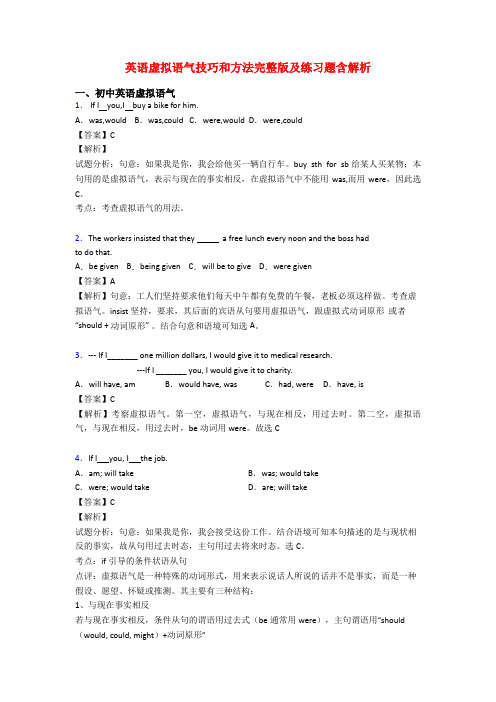
英语虚拟语气技巧和方法完整版及练习题含解析一、初中英语虚拟语气1. If I you,I buy a bike for him.A.was,would B.was,could C.were,would D.were,could【答案】C【解析】试题分析:句意:如果我是你,我会给他买一辆自行车。
buy sth for sb给某人买某物;本句用的是虚拟语气,表示与现在的事实相反,在虚拟语气中不能用was,而用were,因此选C。
考点:考查虚拟语气的用法。
2.The workers insisted that they a free lunch every noon and the boss hadto do that.A.be given B.being given C.will be to give D.were given【答案】A【解析】句意:工人们坚持要求他们每天中午都有免费的午餐,老板必须这样做。
考查虚拟语气。
insist坚持,要求,其后面的宾语从句要用虚拟语气,跟虚拟式动词原形或者“should + 动词原形” 。
结合句意和语境可知选A。
3.--- If I_______ one million dollars, I would give it to medical research.---If I _______ you, I would give it to charity.A.will have, am B.would have, was C.had, were D.have, is【答案】C【解析】考察虚拟语气。
第一空,虚拟语气,与现在相反,用过去时。
第二空,虚拟语气,与现在相反,用过去时,be动词用were。
故选C4.If I you, I the job.A.am; will take B.was; would takeC.were; would take D.are; will take【答案】C【解析】试题分析:句意:如果我是你,我会接受这份工作。
虚拟语气讲解以及练习
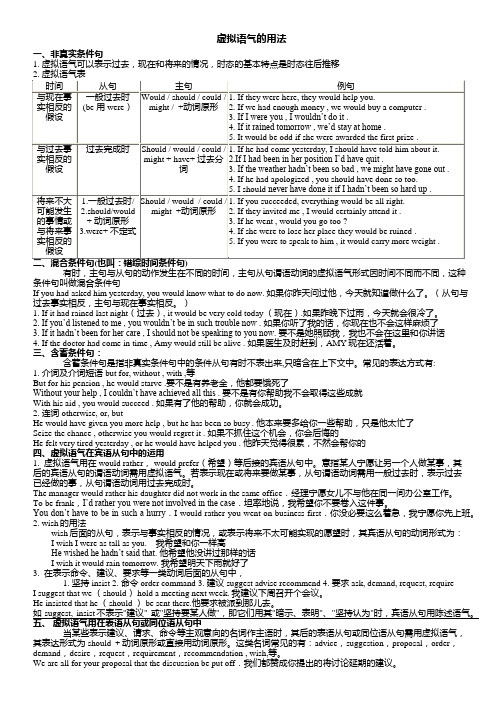
虚拟语气的用法一、非真实条件句1. 虚拟语气可以表示过去,现在和将来的情况,时态的基本特点是时态往后推移有时,主句与从句的动作发生在不同的时间,主句从句谓语动词的虚拟语气形式因时间不同而不同,这种条件句叫做混合条件句If you had asked him yesterday, you would know what to do now. 如果你昨天问过他,今天就知道做什么了。
(从句与过去事实相反,主句与现在事实相反。
)1. If it had rained last night(过去), it would be very cold today (现在).如果昨晚下过雨,今天就会很冷了。
2. If you’d listened to me , you wouldn’t be in such trouble now . 如果你听了我的话,你现在也不会这样麻烦了3. If it hadn’t been for her care , I should not be speaking to you now. 要不是她照顾我,我也不会在这里和你讲话4. If the doctor had come in time , Amy would still be alive . 如果医生及时赶到,AMY现在还活着。
三、含蓄条件句:含蓄条件句是指非真实条件句中的条件从句有时不表出来,只暗含在上下文中。
常见的表达方式有:1. 介词及介词短语 but for, without , with ,等But for his pension , he would starve .要不是有养老金,他都要饿死了Without your help , I couldn’t have achieved all this . 要不是有你帮助我不会取得这些成就With his aid , you would succeed . 如果有了他的帮助,你就会成功。
虚拟语气详解(配练习)
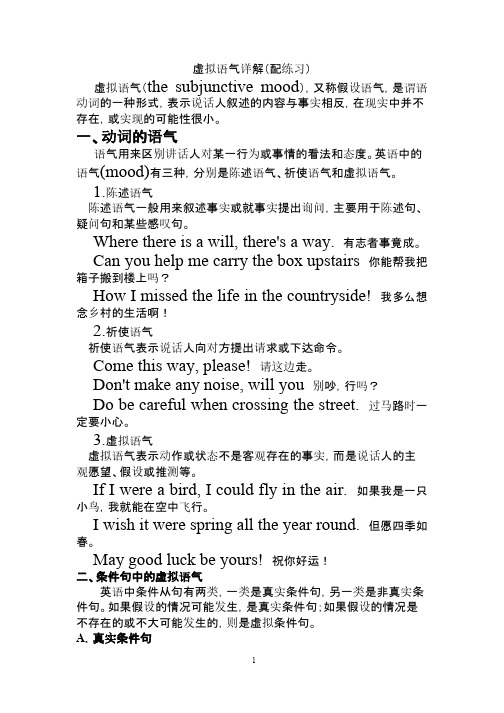
虚拟语气详解(配练习)虚拟语气(the subjunctive mood),又称假设语气,是谓语动词的一种形式,表示说话人叙述的内容与事实相反,在现实中并不存在,或实现的可能性很小。
一、动词的语气语气用来区别讲话人对某一行为或事情的看法和态度。
英语中的语气(mood)有三种,分别是陈述语气、祈使语气和虚拟语气。
1.陈述语气陈述语气一般用来叙述事实或就事实提出询问,主要用于陈述句、疑问句和某些感叹句。
Where there is a will, there's a way. 有志者事竟成。
Can you help me carry the box upstairs 你能帮我把箱子搬到楼上吗?How I missed the life in the countryside! 我多么想念乡村的生活啊!2.祈使语气祈使语气表示说话人向对方提出请求或下达命令。
Come this way, please! 请这边走。
Don't make any noise, will you 别吵,行吗?Do be careful when crossing the street. 过马路时一定要小心。
3.虚拟语气虚拟语气表示动作或状态不是客观存在的事实,而是说话人的主观愿望、假设或推测等。
If I were a bird, I could fly in the air. 如果我是一只小鸟,我就能在空中飞行。
I wish it were spring all the year round. 但愿四季如春。
May good luck be yours! 祝你好运!二、条件句中的虚拟语气英语中条件从句有两类,一类是真实条件句,另一类是非真实条件句。
如果假设的情况可能发生,是真实条件句;如果假设的情况是不存在的或不大可能发生的,则是虚拟条件句。
A.真实条件句真实条件句表示的假设是可能发生或实现的,主句和从句的谓语动词都要用陈述语气。
虚拟语气的用法和注意事项

虚拟语气的用法和注意事项虚拟语气是指在表达假设、愿望、建议、命令等非真实情况时所使用的一种语气。
它能够帮助我们表达一些与现实情况相反或者未实现的想法。
在日常生活和学术写作中,正确地使用虚拟语气将使我们的语言更加准确、严谨。
本文将介绍虚拟语气的常见用法,并提供一些需要注意的事项。
一、虚拟语气的用法:1. 虚拟条件句:虚拟条件句用来表达与现实相反或未实现的假设情况。
其中,谓语动词常用“would”或“should”来表示假设的情况。
例如:- If I were a bird, I would fly in the sky.(如果我是一只鸟,我就会在天空飞翔。
)- If it hadn't rained, we should have gone for a picnic.(如果没有下雨,我们本来会去野餐。
)2. 虚拟愿望句:虚拟愿望句用来表达一种未实现的愿望或者希望。
常用动词如“wish”,“hope”,“desire”等。
例如:- I wish I could speak fluent French.(我希望我能够流利地说法语。
)- She desires that her parents would understand her better.(她希望她的父母能更好地理解她。
)3. 虚拟建议句:虚拟建议句用来表达建议、要求等非真实情况。
常用动词如“suggest”,“recommend”,“request”等。
例如:- I suggest that he go to bed early to get enough rest.(我建议他早点睡觉以获得足够的休息。
)- The boss requested that all employees be punctual for the meeting.(老板要求所有员工在会议上准时到达。
)二、虚拟语气的注意事项:1. 在虚拟条件句中,如果假设是与现在事实相反的情况,谓语动词用过去式;如果假设是与过去事实相反的情况,谓语动词则用过去完成式。
(完整版)虚拟语气的用法及经典练习题(附答案)

(完整版)虚拟语⽓的⽤法及经典练习题(附答案)虚拟语⽓概念虚拟语⽓⽤来表⽰说话⼈的主观愿望或假想,⽽不表⽰客观存在的事实,所说的是⼀个条件,不⼀定是事实,或与事实相反。
虚拟语⽓通过谓语动词的特殊形式来表⽰。
英语中的语⽓分为陈述语⽓、祈使语⽓、虚拟语⽓三类。
应⽤条件在表⽰虚假的、与事实相反的或难以实现的情况时⽤虚拟语⽓,表⽰主观愿望或某种强烈情感时,也⽤虚拟语⽓。
即当⼀个⼈说话时欲强调其所说的话是基于⾃⼰的主观想法,⽽不是根据客观实际,就⽤虚拟语⽓。
在⾮真实条件状语从句中的⽤法真实条件状语从句与⾮真实条件状语从句条件句可分为两类,⼀类为真实条件句,⼀类为⾮真实条件句。
⾮真实条件句表⽰的是假设或实际可能性不⼤的情况,故采⽤虚拟语⽓。
例: If he doesn’t hurry up, he will miss the bus. 如果他不快点,他将错过巴⼠。
( 真实) If he is free, he will ask me to tell stories. 如果他是空闲的,他会要求我讲故事。
(真实)If I were you, I would go at once.如果我是你,我马上就会去。
(⾮真实,虚拟语⽓)If there were no air, people would die. 如果没有空⽓,⼈就会死亡。
(⾮真实,虚拟语⽓)⽤法及动词形式例句:1、表⽰与现在事实相反的情况:例: 1. If I were you, I would take an umbrella. 如果我是你,我会带把伞。
(事实:我不可能是你) 2.If I knew his telephone number, I would tell you. 如果我知道他的电话号码,我就会告诉你。
(事实:不知道) 3.If there were no air or water, there would be no living things on the earth. 如果没有⽔和空⽓,地球上就不会有⽣物。
高中虚拟语气练习题及讲解

高中虚拟语气练习题及讲解1. 题目:假如你昨天没有忘记带手机,你就不会错过那个重要的电话。
答案:If you hadn't forgotten to bring your phone yesterday, you wouldn't have missed that important call.2. 题目:如果他没有生病,他就会参加我们的聚会。
答案:If he hadn't fallen ill, he would have joined our party.3. 题目:如果我有足够的钱,我就会买下那栋房子。
答案:If I had enough money, I would buy that house.4. 题目:如果她没有迟到,她就不会错过那趟火车。
答案:If she hadn't been late, she wouldn't have missedthe train.5. 题目:如果他们没有取消会议,我们就会讨论这个问题。
答案:If they hadn't canceled the meeting, we would have discussed this issue.6. 题目:假如我们昨天没有下雨,我们就去野餐了。
答案:If it hadn't rained yesterday, we would have gonefor a picnic.7. 题目:如果他没有努力学习,他就不会通过考试。
答案:If he hadn't studied hard, he wouldn't have passedthe exam.8. 题目:如果我没有收到你的邮件,我就不会知道这个消息。
答案:If I hadn't received your email, I wouldn't have known the news.9. 题目:假如我们提前出发,我们就不会迟到。
高中英语虚拟语气详解和练习(含答案解析)
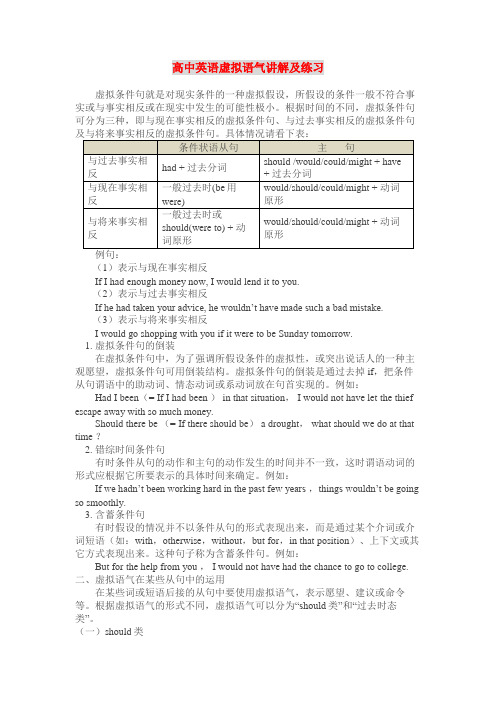
高中英语虚拟语气讲解及练习虚拟条件句就是对现实条件的一种虚拟假设,所假设的条件一般不符合事实或与事实相反或在现实中发生的可能性极小。
根据时间的不同,虚拟条件句可分为三种,即与现在事实相反的虚拟条件句、与过去事实相反的虚拟条件句(1)表示与现在事实相反If I had enough money now, I would lend it to you.(2)表示与过去事实相反If he had taken your advice, he wouldn’t have made such a bad mistake.(3)表示与将来事实相反I would go shopping with you if it were to be Sunday tomorrow.1. 虚拟条件句的倒装在虚拟条件句中,为了强调所假设条件的虚拟性,或突出说话人的一种主观愿望,虚拟条件句可用倒装结构。
虚拟条件句的倒装是通过去掉if,把条件从句谓语中的助动词、情态动词或系动词放在句首实现的。
例如:Had I been(= If I had been ) in that situation, I would not have let the thief escape away with so much money.Should there be (= If there should be) a drought, what should we do at that time ?2. 错综时间条件句有时条件从句的动作和主句的动作发生的时间并不一致,这时谓语动词的形式应根据它所要表示的具体时间来确定。
例如:If we hadn’t been working hard in the past few years ,thing s wouldn’t be going so smoothly.3. 含蓄条件句有时假设的情况并不以条件从句的形式表现出来,而是通过某个介词或介词短语(如:with,otherwise,without,but for,in that position)、上下文或其它方式表现出来。
英语语法专项:虚拟语气用法详解及练习(附答案)
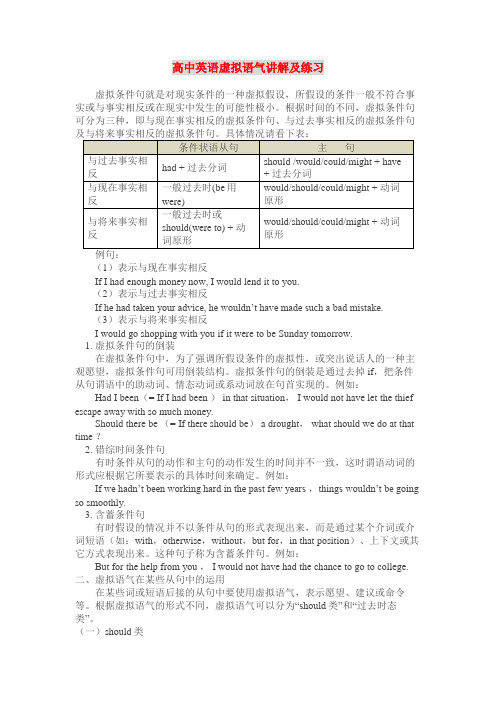
高中英语虚拟语气讲解及练习虚拟条件句就是对现实条件的一种虚拟假设,所假设的条件一般不符合事实或与事实相反或在现实中发生的可能性极小。
根据时间的不同,虚拟条件句可分为三种,即与现在事实相反的虚拟条件句、与过去事实相反的虚拟条件句(1)表示与现在事实相反If I had enough money now, I would lend it to you.(2)表示与过去事实相反If he had taken your advice, he wouldn’t have made such a bad mistake.(3)表示与将来事实相反I would go shopping with you if it were to be Sunday tomorrow.1. 虚拟条件句的倒装在虚拟条件句中,为了强调所假设条件的虚拟性,或突出说话人的一种主观愿望,虚拟条件句可用倒装结构。
虚拟条件句的倒装是通过去掉if,把条件从句谓语中的助动词、情态动词或系动词放在句首实现的。
例如:Had I been(= If I had been ) in that situation, I would not have let the thief escape away with so much money.Should there be (= If there should be) a drought, what should we do at that time ?2. 错综时间条件句有时条件从句的动作和主句的动作发生的时间并不一致,这时谓语动词的形式应根据它所要表示的具体时间来确定。
例如:If we hadn’t been working hard in the past few years ,thing s wouldn’t be going so smoothly.3. 含蓄条件句有时假设的情况并不以条件从句的形式表现出来,而是通过某个介词或介词短语(如:with,otherwise,without,but for,in that position)、上下文或其它方式表现出来。
英语虚拟语气的用法归纳

英语虚拟语气的用法归纳英语虚拟语气是一种语法现象,用来表达与事实相反、假设、愿望、建议等与现实情况不符的情态。
以下是英语虚拟语气的用法归纳:1. 虚拟条件句:a. Type 1:表示可能实现的条件句,使用"if + 一般过去时",主句使用"would/ could/ should/ might + 动词原形"。
示例:If I had money, I would buy a car.(如果我有钱,我会买车。
)b. Type 2:表示不可能实现的条件句,使用"if + 过去式",主句使用"would/ could/ should/ might + 动词原形"。
示例:If I were you, I would quit that job.(如果我是你,我会辞职。
)c. Type 3:表示过去未实现的条件句,使用"if + 过去完成时",主句使用"would/ could/ should/ might + have + 过去分词"。
示例:If I had studied harder, I would have passed the exam.(如果我学得更努力,我就能通过考试。
)2. 虚拟表达愿望或建议:a. 表达愿望时,使用"wish + 主语 + 过去式"。
示例:I wish I were taller.(但实际上我不高。
)b. 表达建议、要求或命令时,使用"would/ could/ might + 动词原形"。
示例:I suggest that you should study harder.(我建议你应该学习更努力。
)3. 虚拟表达假设:a. 使用"as if/ though"引导的从句中,使用虚拟语气,表示与事实相反。
虚拟语气详细讲解及经典习题 附答案
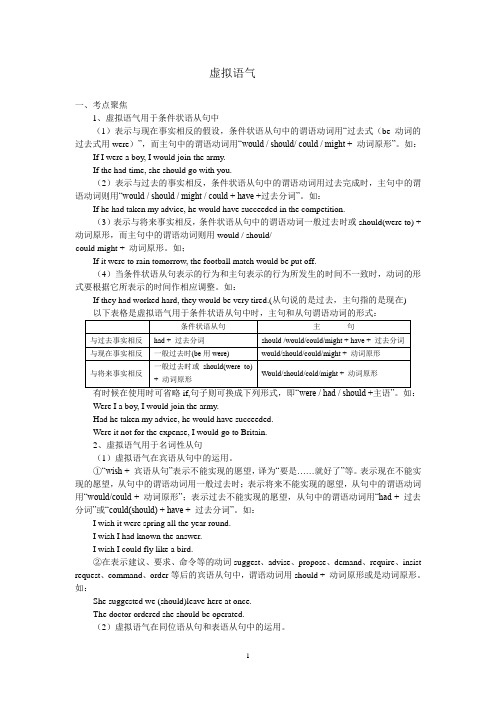
虚拟语气一、考点聚焦1、虚拟语气用于条件状语从句中(1)表示与现在事实相反的假设,条件状语从句中的谓语动词用“过去式(be动词的过去式用were)”,而主句中的谓语动词用“would / should/ could / might + 动词原形”。
如:If I were a boy, I would join the army.If the had time, she should go with you.(2)表示与过去的事实相反,条件状语从句中的谓语动词用过去完成时,主句中的谓语动词则用“would / should / might / could + have +过去分词”。
如:If he had taken my advice, he would have succeeded in the competition.(3)表示与将来事实相反,条件状语从句中的谓语动词一般过去时或should(were to) + 动词原形,而主句中的谓语动词则用would / should/could might + 动词原形。
如;If it were to rain tomorrow, the football match would be put off.(4)当条件状语从句表示的行为和主句表示的行为所发生的时间不一致时,动词的形式要根据它所表示的时间作相应调整。
如:If they had worked hard, they would be very tired.(从句说的是过去,主句指的是现在)Were I a boy, I would join the army.Had he taken my advice, he would have succeeded.Were it not for the expense, I would go to Britain.2、虚拟语气用于名词性从句(1)虚拟语气在宾语从句中的运用。
英语语法专项:虚拟语气用法详解及练习(附答案)
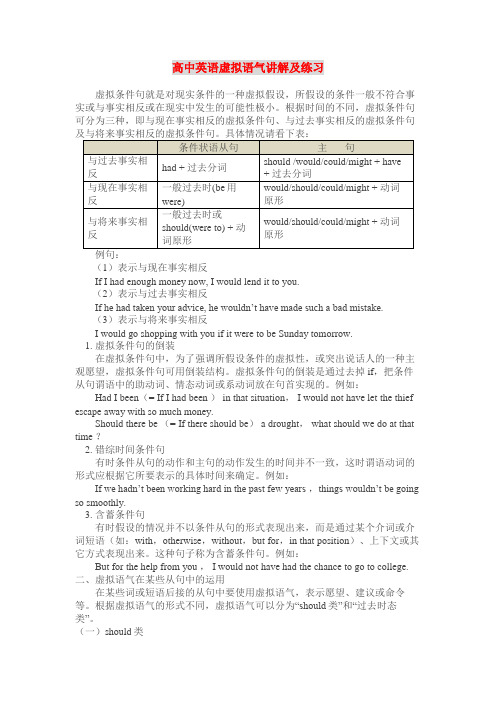
高中英语虚拟语气讲解及练习虚拟条件句就是对现实条件的一种虚拟假设,所假设的条件一般不符合事实或与事实相反或在现实中发生的可能性极小。
根据时间的不同,虚拟条件句可分为三种,即与现在事实相反的虚拟条件句、与过去事实相反的虚拟条件句(1)表示与现在事实相反If I had enough money now, I would lend it to you.(2)表示与过去事实相反If he had taken your advice, he wouldn’t have made such a bad mistake.(3)表示与将来事实相反I would go shopping with you if it were to be Sunday tomorrow.1. 虚拟条件句的倒装在虚拟条件句中,为了强调所假设条件的虚拟性,或突出说话人的一种主观愿望,虚拟条件句可用倒装结构。
虚拟条件句的倒装是通过去掉if,把条件从句谓语中的助动词、情态动词或系动词放在句首实现的。
例如:Had I been(= If I had been ) in that situation, I would not have let the thief escape away with so much money.Should there be (= If there should be) a drought, what should we do at that time ?2. 错综时间条件句有时条件从句的动作和主句的动作发生的时间并不一致,这时谓语动词的形式应根据它所要表示的具体时间来确定。
例如:If we hadn’t been working hard in the past few years ,thing s wouldn’t be going so smoothly.3. 含蓄条件句有时假设的情况并不以条件从句的形式表现出来,而是通过某个介词或介词短语(如:with,otherwise,without,but for,in that position)、上下文或其它方式表现出来。
最全的虚拟语气讲解及练习

虚拟语气语气:动词的一种形式,表说话人对发生的动作或所处的状态持有的态度或看法。
英语中包括有:陈述事实的陈述语气;提出请求、命令等的祈使语气;表主观愿望和假想虚拟的虚拟语气。
一、用在一般虚拟条件句中的虚拟语气从句中提出一种与客观现实不相符或根本不可能存在的条件,主句会产生的一种不(1) 将来时的条件句中的虚拟语气。
如:If he should go to Qing Hua University, he would make full use of his time. 如果他要上清华大学的话,他就会充分利用他的时间了。
If he were to come here, he would tell us about it. 如果他要来的话,他会通知我们一声。
(2) 现在时的条件句中的虚拟语气。
如:If he were free, he would help us. 要是他有空的话,它会帮助我们的。
If he studied at this school, he would know you well. 如果他在这所学校学习的话,它会对你很熟悉。
(3) 过去时的条件句中的虚拟语气。
如:If I had seen the film, I would have told you about it. 我如果看过这场电影,我会把电影内容告诉你了。
If I had got there earlier, I would have met Mr. Li. 如果我早点到那儿,我就会会到了李先生。
运用条件句中的虚拟语气时,须注意的几个问题有时,虚拟条件句中,主、从句的动作若不是同时发生时,须区别对待。
①从句的动作与过去事实相反,而主句的动作与现在或现在正在发生的事实不符。
如:If I had worked hard at school, I would be an engineer, too. 如果我在学校学习刻苦的话,我现在也会是工程师了If they had informed us, we would not come here now. 如果他们通知过我们的话,我们现在就不会来这里了。
虚拟语气十八例及练习

英语中的虚拟语⽓是四、六级考试的必考考点。
如果你掌握了以下⼗⼋个例句,再做好⽂后所配的练习,虚拟语⽓难题就可以迎刃⽽解了。
⼀、虚拟语⽓在条件从句中的⽤法 (⼀)形式 略 注: 1.在从句中,be动词多⽤were的形式。
在⼝语中,如果主语是第⼀、第三⼈称单数的话,be动词可⽤was,但⼈们总是说:If I were you... 2.主句中的谓语可以由would,should,could和 might这四个不同的情态动词来构成。
3.与将来事实相反的条件从句中,谓语有三种不同的形式:过去式、were +to do或should +do. 例句1:If I were you,I would study hard.我要是 你的话,我就会好好学习。
(与现在事实相反) 例句2:If I had studied hard,I would have passed CET-6 last semester.我要是早就好好学习的话,那么我上个学期就通过六级考试了。
(与过去事实相反) 例句3:If Iwere to pass CET-6,I would treat you to dinner at KFC.我要是过了六级考试,就请你去吃肯德基。
(与将来事实相反) (⼆)省略/倒装 如果在虚拟从句中包含有⼀个助动词、情态动词、动词be或have,则可把if省略,把上类动词提到主语之前,使⽤倒装语序。
例句4:Had it not been for the PLA,we wouldn't have been able to beat the flood.4要不是⼈民解放军,我们是⽆法战胜洪⽔的。
例句5:Were he here now,he would certainly help me.5他要是在这⾥肯定会帮我的忙。
注4:例句4中的从句部分出现了否定词not,如果把该句还原成正常语序,应该是: If it hadn't been for the PLA,we wouldn't have been able to beat the flood. 但是⼀旦句⼦发⽣了省略,就必须把hadn't分开,否定词not还原,放在主语之后,不可写成Hadn't it been for的形式。
- 1、下载文档前请自行甄别文档内容的完整性,平台不提供额外的编辑、内容补充、找答案等附加服务。
- 2、"仅部分预览"的文档,不可在线预览部分如存在完整性等问题,可反馈申请退款(可完整预览的文档不适用该条件!)。
- 3、如文档侵犯您的权益,请联系客服反馈,我们会尽快为您处理(人工客服工作时间:9:00-18:30)。
虚拟语气一、虚拟语气表示一种不能实现的假设。
该语法主要用于if条件状语从句。
也可用于主语从句、表语从句、宾语从句等。
二、if条件状语从句中虚拟语气的判断判断是真实条件句还是非真实条件句。
只有在非真实条件句中才使用虚拟语气。
通过句子意思,看假设的条件是否能够实现,能够实现是真实条件句,不能使用虚拟语气;假设的条件不能实现则是非真实条件句,要用虚拟语气。
判断这个假设是与哪个事实相反。
通常有三种情况:①与过去事实相反。
②与现在事实相反。
③与将来事实可能相反。
三、“后退一步法”后退一步法是指在准确地判断了该句与哪一事实相反后,按虚拟语气的后退一步法处理从句谓语动词的时态。
即:在非真实条件状语从句中,谓语动词按正常情况“后退一步”。
也就是:①与过去事实相反,在从句中用过去完成时形式表示。
②与现在事实相反,在从句中用过去一般时形式表示。
③与将来事实可能相反,在从句中用过去将来时形式表示。
主句中则用情态动词would, should, could 等加一个与从句一致的动词形式。
例:1)If I had come her yesterday, I would have seen him.If we had started earlier, we should not have missed the train.If she hadn’t been ill, she might have come.2)If I were a teacher, I would be strict with my students.If I were a bird, I would fly to you.If it were not for their help, we should be in a very difficult position.3)If it should snow tomorrow, they couldn’t go out.If Professor Li should have time tomorrow, we could ask him some questions.If there should be no air, there would be no living things.四、注意事项if条件句中如有were, should, had,可以省去if,并使用倒装语序。
在现代英语中if条件状与从句中的谓语动词如果是be其过去形式一般用were。
例:Had I had time, I would have done that yesterday.Were he in your position, he’d have done the same.Should he come tomorrow, I should give him the dictionary.●错综时间虚拟句通常情况下,在非真实条件句中主句和从句的谓语动词所指时间是一致的, 但有时也可能指不同的时间,这时要根据上下文的意思采用不同的谓语动词形式.例:If I had taken my raincoat with me this morning, I would not be wet now. (从句指过去,主句指现在).●含蓄条件句有时假设的情况并不以条件从句表示出来,而是暗含在上下文中,比如通过介词短语来表示.例:But for your advice, I could not have done it so successfully.The change could not have taken place without the open-door policy.I was so busy then, Otherwise, I would have told him the answer.●三种从句中的虚拟语气一、wish 后面宾语从句中的虚拟语气“wish + 宾语从句”表示不能实现的愿望,译为“要是……就好了”等。
表示现在不能实现的愿望,从句中的谓语动词用一般过去时;表示将来不能实现的愿望,从句中的谓语动词用“would/could + 动词原形”;表示过去不能实现的愿望,从句中的谓语动词用“had + 过去分词”或“could(should) + have + 过去分词”。
如:I wish I had known the answer.I wish it were spring all the year round.I wish I could fly like a bird.wish 后面宾语从句中的虚拟语气,按“后退一步法”处理从句的谓语动词。
注意:与哪个事实相反,不能以主句的时态为判断依据,而是根据从句的意义判断。
二、It is time(about time,high time)that ...(过去式动词形式或should+动词原形)....It is high time I went home now. = It is high time I should go home now.例:It’s time that I picked up my daughter.It’s high time we were going.It is high time that people learnt English.三、would rather +从句would rather后的从句要用虚拟语气,是一个常用的虚拟语气句型,谓语一般用过去时态表示与现在或将来事实相反,用过去完成时表示与过去事实相反,其意为“宁愿……,还是…… 好些”“一个人宁愿另一个人做某事”。
引导从句的that常省略。
在谈到过去的动作时,谓语则用过去完成时。
1.一般过去时表示现在或将来的愿望例:I’d rather you went tomorrow (now). 我宁愿你明天(现在)去。
I’d r ather you were happy. 我愿你快乐。
I’d rather Jack left on an earlier train. 我宁愿杰克乘前一班火车走。
You always go without me and l’d rather you didn’t.你总是不带我去,我可不愿意你这样。
“Shall I open the window? ” “I’d rather you didn’t. ”“我要不要把窗子打开? ” “我看不要打开好。
”Henry would rather that his girlfriend worked in the same department as he does.亨利希望他的女朋友和他在一个部门工作。
Don't come tomorrow, I'd rather you came next week. (与将来事实相反)Don’t come tomorrow. I’d rather you came next weekend.明天别来。
我希望你下周末来。
2. 用过去完成时表过去的愿望例:I’d rather you hadn’t said it. 我真希望你没有这样说过。
I’d rather you hadn’t done that. 我宁愿你没这样做。
l’d rather you had been / hadn’t been present。
我(宁) 愿你当时在场/ 不在场。
l’d rather he had told / hadn’t told me about it我(宁) 愿他告诉了/ 未告诉我这件事。
Katie went by car and I’d rather she hadn’t.凯蒂是坐汽车去的,我宁愿地不坐汽车去。
注:1)如果谈到过去的动作,也就是表示过去已经发生的事情在选择上不恰当。
此时,主句一般为I had rather ,其(that)从句则用过去完成时。
例:Would rather you had not done that. 我真希望你没有做那件事。
2)如果只涉及主语本人而不涉及另一个人,则would rather之后不接that从句而接have done结构。
例:I would rather have gone to the theatre than stayed home night.我真希望昨天晚上去看了戏而不是呆在家里。
●主语从句中的虚拟语气一、It be + 形容词+ that ...(should)...用于该句型的形容词是:necessary, good, important, right, wrong, better, natural, proper, funny, strange, surprising,essential, imperative, advisable, desirable, possible, probable, astonishing, desired, suggested, requested, recommended, ordered, proposed, decided, moved, incredible等例: It's suggested that…It is necessary(important, natural, strange, etc.)that we should clean the room every day.It will be desired(suggested, decided, ordered, requested, proposed, etc.)that she should finish her homework this afternoon. 注意:这种从句表示的是事实。
如果说人对这种事实表现出惊奇的情感,就可用虚拟语气。
反之,如果不表示惊奇等情感,that从句也可用陈述句语气。
一些名词也可以用于在该结构中。
如:a pity,a shame,no wonder....例:It was a pity (a shame, no wonder, etc.)that you should be so careless.●should + 动词原形的句子一、在由for fear that, in case, lest等引导的状语从句中,用“ should + 动词原形” 表示“惟恐”的意思.例: He handled the instrument with care for fear that it should be damaged.二、表示“愿望、要求、建议、命令”等动词在宾语、表语、同位语从句中的虚拟语气从句中用“should + 动词原形”构成。
